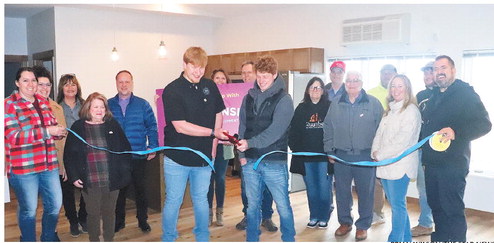TCHA helps people purchase, stay in homes
Home ownership has been the cornerstone of the American Dream for generations.
There is ample research that having a safe and secure home helps build a stable foundation for families which leads to healthier communities overall. While the dream of home ownership is achievable for many, others need a boost to get to that point. This is where the Taylor County Housing Authority (TCHA) plays a role.
While its offices are on the first floor of the Taylor County Courthouse in Medford and receives support from the county, the TCHA is an independent agency that has a mission of fulfilling the promise that everyone should have equal opportunity for housing. The agency is run by director Jessica Mudgett who came to the agency with decades of consumer and business lending experience.
According to Mudgett, the TCHA has a number of programs to assist income-eligible prospective and current homeowners with home ownership and rehabilitation expenses.
One of the biggest areas of work for TCHA is helping with rehabilitation projects. The agency receives federal grants to help with the project and uses those funds to loan out to low income homeowners who need necessary work done.
TCHA takes a second mortgage position with no interest or payments on the loan typically until it is sold. Mudgett said the list of rehabilitation projects that they have been involved with is lengthy including things such as siding, heating, roofing, electrical, insulation, foundation, well and septic upgrades, windows and doors and accessibility improvements. Mudgett said they work with a number of local contractors and that one of the major challenges recently is finding contractors to do, what are often minor repairs such as installing the proper ground-fault outlets in bathrooms.
The agency also offers homebuyer assistance programs to help with down payment and closing costs. Mudgett explains that they work closely with area financial institutions and lenders. She said they often get referrals from those financial institutions to work together to help make home ownership possible for lower income residents.
Many of the programs offered by TCHA are incomebased with income limits based on wages and family size. For example, a family of one person has an income limit of $40,250 while a family of eight has an income limit of $75,850.
One of the areas that TCHA works with is helping those who have run into rough times with a foreclosure prevention program. The program helps eligible people facing foreclosure to get a second mortgage to pay off the foreclosure amount, pay back taxes and get back on track. While this helps not only the homeowners, it also helps the financial institutions avoid losses and governments from losing tax revenue.
“We have done several pulling them out of the in rem process,” Mudgett said.
One of the newest programs the agency offers is to manage the Taylor County Private Onsite Waste Treatment System Revolving Loan Program. This was a program set up by the county to help residents with upgrading and replacing failed septic systems.
The program has its own income eligibility going with a gross household annual income of less than or equal to $55,000 in the last three-year average with loan amounts up to $15,000 for terms of four to 10 years. A 3% service fee is added to the loan amount and included with the monthly payments.
This program was developed by Taylor County to serve those who did not meet the lower income thresholds of other programs and who would otherwise not have the resources to get the projects done.
In addition to these programs, TCHA has been working to increase access to affordable housing in the community. TCHA was able to purchase a tax foreclosure property in Medford and offer it as a three-bedroom rental and has a similar property in Gilman. “We want them to be a stepping stone,” Mudgett said, noting the goal is to get the residents into home ownership.
According to Mudgett the relationship between TCHA and area realtors and lenders is positive as they all work to get the most for the clients and to make home ownership as affordable as possible.
She said many financial institutions have their own downpayment assistance programs and that they work in cooperation with those. She noted that many of the projects they work on help not only the clients, but help the overall community by working to prevent properties from falling into disrepair.




